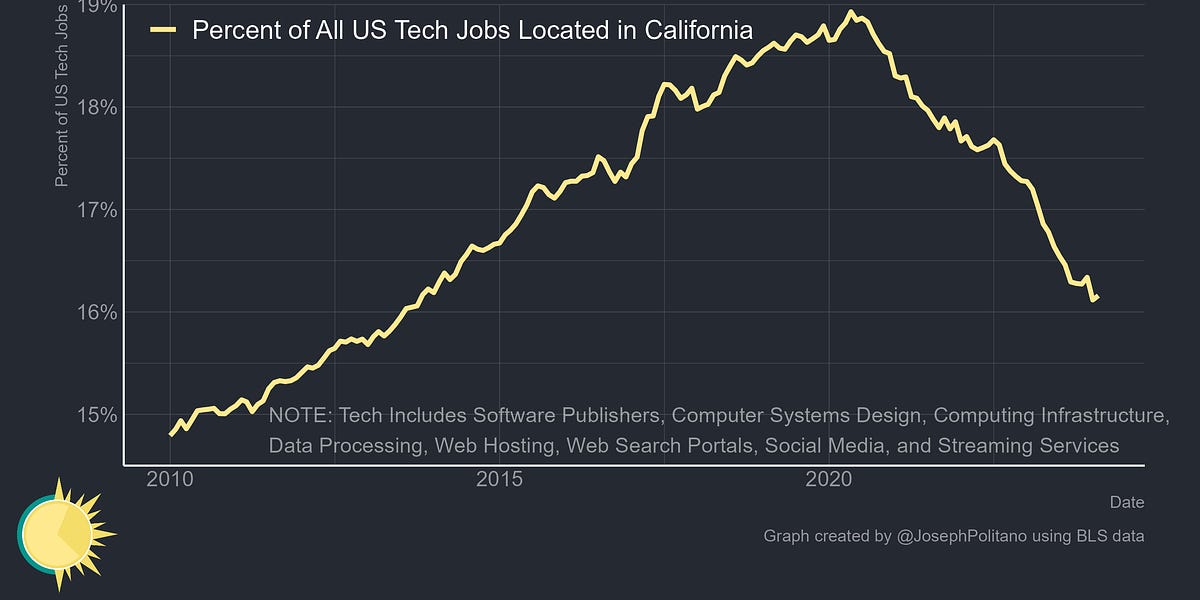California is Losing Tech Jobs

🌈 Abstract
The article discusses the decline of tech jobs in California, particularly in the Silicon Valley region, and the broader implications for the state's economy.
🙋 Q&A
[01] California is Losing Tech Jobs
1. What are the key factors contributing to the decline of tech jobs in California?
- The tech industry has faced significant obstacles since the pandemic, including monetary policy tightening, fading pandemic-driven surge in online activity, macroeconomic uncertainty, and failures of key tech financial institutions.
- California has been particularly hard hit, losing jobs in key tech subsectors like computer systems design, streaming & social networks, software publishing, and web search.
- As a result, California's share of total U.S. tech jobs has fallen to the lowest level in over a decade.
2. Where are the tech jobs moving from California?
- Texas, Washington, Florida, and other states have seen significant growth in tech/information sector jobs, while California and New York have seen more modest growth.
- Census data shows that Texas has been the single largest destination for net outmigration of California information-sector workers, followed by Washington, New York, and Oregon.
3. What are the broader economic impacts for California from the loss of tech jobs?
- California's GDP fell 2.1% in 2022, the second-biggest drop of any state, driven by the slowdown in the information sector.
- The loss of tech jobs has impacted California's housing market, with rent and home price growth cooling significantly compared to national averages.
- The state's public finances have also been hurt, as tech-related tax revenues have dropped sharply, leading to budget deficits and cuts to state spending.
[02] California and the Tech-cession
1. How have the job loss revisions in California's tech sector been characterized?
- Revisions to California's 2022-2023 job growth data showed a much larger decline than initially estimated, with the state's information and professional/business services sectors (which encompass tech jobs) revised down by 156,000 jobs.
- This solidified the fact that California was losing ground as a share of nationwide employment across many tech subsectors.
2. Which tech subsectors have seen the largest declines in California's share of national employment?
- California's share of jobs in software publishing and computer system design has fallen to some of the lowest levels on record.
- In web search, California's share has fallen to the lowest level in more than a decade.
3. How have the job losses in California's tech hubs like San Francisco and San Jose compared to other major cities?
- The San Francisco metro area has lost 54,000 jobs since 2020, the largest drop of any major American city.
- Los Angeles has lost the second-most tech jobs at 38,000, and San Jose is still down 6,000 jobs.
[03] What it Means for the Golden State
1. How have the shifts in tech jobs impacted California's housing market?
- Rent price growth in San Francisco and Los Angeles has fallen well below the national average since the start of the pandemic, as remote work enabled many to move for cheaper housing elsewhere.
- Home values within the city of San Francisco proper are at their lowest levels since 2017, down over 17% from mid-2022 peaks.
2. What has been the impact on California's public finances?
- Tech-related tax revenues, including from equity compensation and IPOs, have dropped sharply, leading to significant budget deficits and cuts to state spending.
- To the extent the U.S. tech industry is now less concentrated in California, it will mean less future potential revenue for the state.
3. Is there any potential for a tech rebound in California?
- There are signs of a short-term rebound, with revenue growth recovering in key tech subsectors and physical investment in the industry accelerating.
- However, California's long-standing problem is its inability to accommodate growth due to restrictive housing policies, which has now led to opportunity loss as tech jobs move to other states.